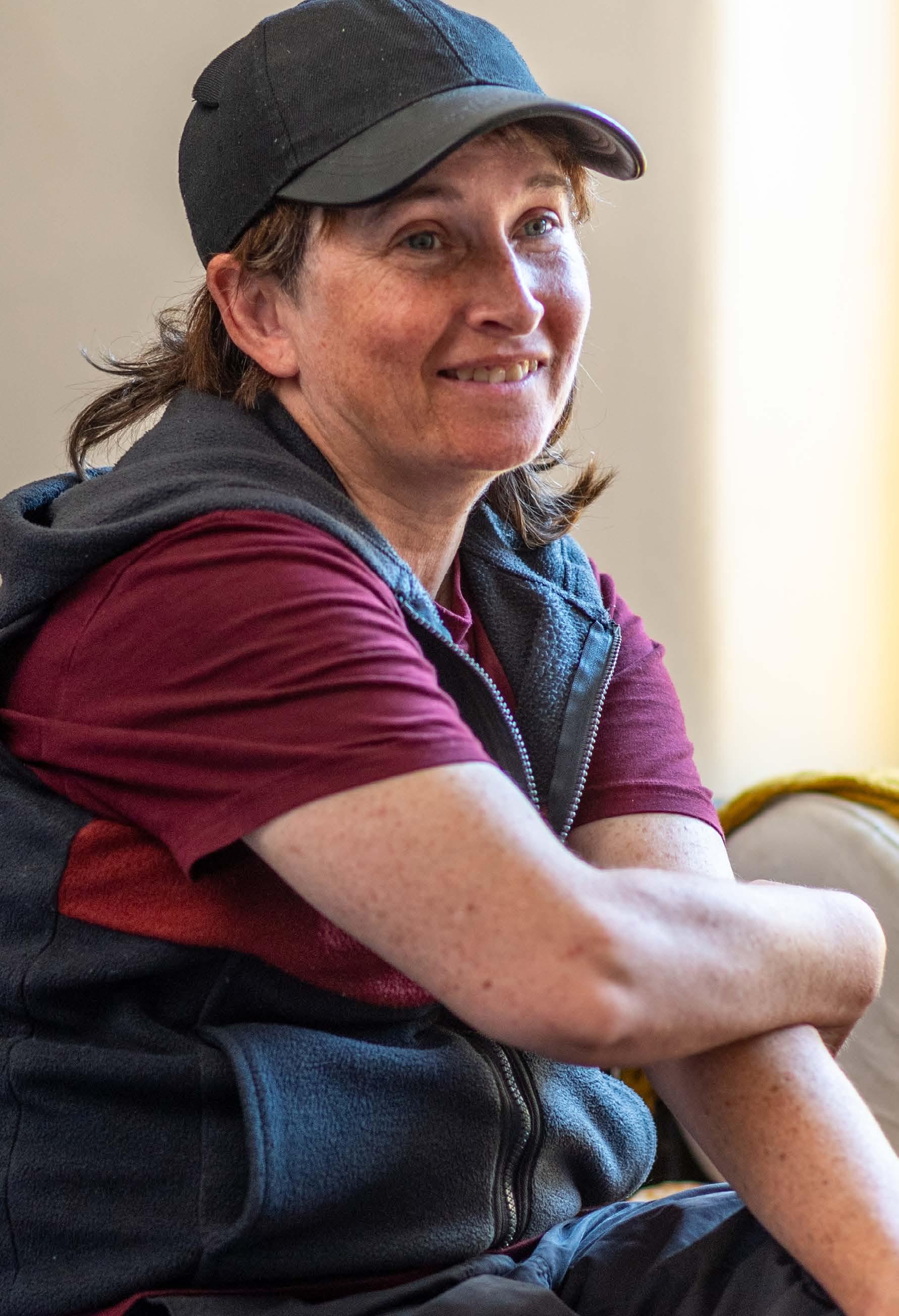
Spring 2024
magazine for members of Rethink Mental Illness
story: Living with Schizophrenia
challenges in conducting research
webinars: Social Inclusion
Your Voice
The
Paul's
The
Member
p6 - 7
Reforming the Mental Health Act Update from our campaigns team
p8 - 9 Member webinars
Social inclusion and mental illness
p10 - 11
Paul's story
'You can still have a fulfilling, happy life despite schizophrenia"
P 12 Challenges in conducting evidence-based mental health research
P 14 Our Suicide Bereavement Services
Upcoming events and awareness days we’re involved with
March
18 - 24
Neurodiversity Celebration Week
30 World Bipolar Day
April
Stress Awareness Month
24 Member's webinar
Editorial team: Sophie Bray and Alice Clifford
Contributors: Davinder Kaur, Rachel Hastings-Caplan, Kelsey Smith, Dominique Toyra, Nicole Young, Karishma Pindoria
Design: Marie Havard and Rebecca Allen
Print: Fretwells
May
13 - 19
Mental Health Awareness Week
June
10 - 16
Carer's Week
1 - 7 Volunteers' Week
Views expressed in this magazine do not necessarily represent those of Rethink Mental Illness, unless agreed by the Board of Trustees. For reasons of confidentiality the testimonials used sometimes do not relate to the individuals photographed.
© Rethink Mental Illness 2024. Registered in England Number 1227970. Registered Charity Number 271028. Registered Office The Dumont, 28 Albert Embankment, London SE1 7GR.
02
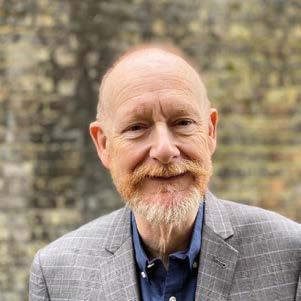
A very warm welcome to the spring issue of your member magazine.
I want to use this space to address that the start of the year has seen a number of high profile media reports about failings within the mental health system and the trauma or abuse some people experience. We know the distress this can cause and I want to say unequivocally that we hear you.
We will never stop fighting for the rights of people living with mental illness and challenging the ongoing stigma they face.
We know that there are amazing people working in services up and down the country. But mental health services, both in the NHS and beyond, need more funding and more staff so that you get the right care and treatment at the right time. That’s what we’re calling for.
We are in an election year, and we will do everything we can to get all of the political parties to commit to improving mental health provision.
I also want to remind you make sure your voice is heard at this election and to register to vote at www.gov.uk/register-to-vote. You can choose to vote in person or by post or you can vote by proxy, which is when you apply for someone else to vote for you.
It can be difficult in the face of negative stories about mental illness to find optimism. But I draw strength from our work as charity and the role we all play in bringing about change.
It feels as if we have never been needed more.
With very best wishes,
Mark Winstanley Chief Executive
03
Our new membership offer
We have been reviewing our membership offer for a number of months now, conducting research about our existing membership offer and also learning from ideas and suggestions to improve the experience.
Thank you to all of you who fed into this process, either by returning a survey or by attending a discussion group. Your involvement and support has been incredibly helpful.
We are delighted to now share some of the changes we are introducing which we believe will make our offer more inclusive. We are also offering more membership benefits that will enable you to feel a stronger sense of connection and belonging through a variety of networking opportunities.
We have tweaked our membership fees and are introducing a £6 per year unwaged membership for those who aren’t in paid work - whether because they are on benefits or a student. People who select this option will receive the same membership benefits as our £27 per year membership.
This £6 per year unwaged membership option will replace our £6 per year e-membership, however

we will continue to honour £6 e-membership for those of you who already have it.
We are now also offering exclusive webinars for you every three months. As well as being an opportunity to learn more about a particular topic they will also be an opportunity to meet and learn from other members, further developing the community aspect of our membership offer. Further details about the content of these webinars are on pages eight and nine.
Alongside this we’ve been working hard to improve our processes and communication to you, and hope that you will start to notice an improvement in your membership experience over the coming months. As always, thank you for your continued support.
We welcome any comments or feedback you have about the new membership offer, or anything else, so please email us on membership@rethink.org or call on 0121 522 7016.
04
Our News

Celebrating David Johnson
David Johnson, one of our mental health recovery workers at Walsall Sanctuary Hub, was featured in BBC news earlier this year. David met Maddie in 2020 when she had hit rock bottom and planned to end her life. By stopping and talking to Maddie, David saved her life.
This is the reason David changed his career and is now a mental health recovery worker for us. In 2023 the pair met after Maddie said: "I needed to see the person who meant like so much to me throughout these years."
You can watch the video of the pair meeting on the BBC news website in the Birmingham & Black Country section.
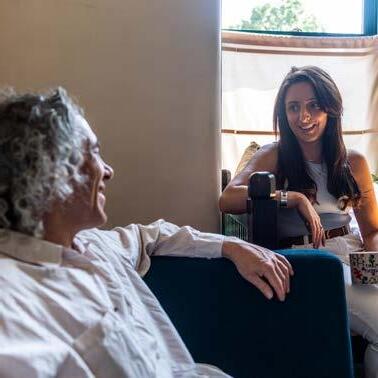
Share your story
Would you like to share your story of living with, or caring for somebody who lives with, mental illness? Carers week is 10 - 16 June, and the theme this year is 'Putting carers on the map'. We’re particularly keen to hear from carers who can share their experiences.
You can share your story in a future issue of Your Voice – it can be helpful for members to hear from each other and learn about each other’s experiences, or your story can be shared on our website and across our social media channels.
Contact us by emailing membership@rethink.org or call us on 0121 522 7016 if you’d like to learn more about how to share your story.
05 Our News

Reforming the Mental Health Actcampaigns update
We spent much of last year continuing our campaign to reform the Mental Health Act. The act forms the legislation which allows for people to be detained and treated without their consent when experiencing a mental health crisis.
Specifically, we wanted to see the Mental Health Bill included in the King’s Speech last November. This did not happen, which means that the act will not be reformed before the general election which takes place this year.
The King’s Speech was the last opportunity for the government to honour its commitment to reform the act. The failure to do so is a profound betrayal to people that have been detained under the Mental Health Act and everyone who has campaigned for decades to reform it.
Jez, 40 from the West Midlands, has a diagnosis of bipolar disorder and has experience of being detained under the Mental Health Act.
“I’m really disappointed and perplexed that we have to wait longer for reform because the case is so clear that the legislation isn’t up to date. Irrespective of who we are or where we’re from, if you’re not right in your thoughts and feelings and you don’t feel listened to, the prospect of recovery can feel distant. Reform of the Mental Health Act should be a priority.”
06 Campaigns
That’s why, as we head towards a general election, a reformed Mental Health Act will be one of the key changes that we will be asking the main political parties to prioritise should they form the next government.
The good news though is that, we have been promised that if Labour win the election, they will reform the act in their first King’s Speech. This news came after the amazing campaigning efforts of Rethink Mental Illness campaigners and charities across the sector. It’s a positive step and shows that campaigning works. But there’s so much more to be done.
For now, we wanted to say thank you for playing your part and for making a difference. We’ll keep you updated with news from other political parties and the next steps for the campaign.
Get involved
If you would like to add your voice to our ongoing campaign to reform the Mental Health Act please get in touch with Davinder Kaur, Head of Campaigns at campaigns@rethink.org. Davinder will be able to advise you on how to support the campaign at both a national and local level.
Did you know we have a podcast?
Through our podcast we speak to people living with mental illness, people working in mental health, and the policy makers and thought leaders trying to ensure that the future of living with mental illness is brighter. You can listen to our podcasts by heading to rethink.org/podcasts or search us on Spotify at The Rethink Mental Illness Podcast.
Some of our recent podcasts:
‘How do we know we make a difference?’
Identifying how our work is making a difference for people using our services is a difficult thing to measure. In this episode we chat to Brian Dow, deputy CEO of Rethink Mental Illness, and Richard McManus, Head of Evidence and Impact, to better understand how we prove we’re doing the right things.
'Typist Artist Pirate King
- Carol Morley' Screenwriter, director and producer Carol Morley joins us to chat about her film ‘Typist Artist Pirate King’, based on the life of artist Audrey Amiss (played by Monica Dolan) who lived with a diagnosis of schizophrenia. Carol discusses Audrey’s life, portraying mental illness on the silver screen, and how the film came to be.
07
Media

Webinars for members
As mentioned on page four, we are pleased to now be running regular webinars as part of our membership offer to you. These webinars will occur every three months on a Wednesday lunch time, 12-1pm. They will be on a variety of subjects and will be led by experts both from within our organisation and outside.
As well as information sharing, the webinars are also an opportunity to get to know other members who have experience of mental illness. Each webinar will have time towards the end for you to build these connections. This may be through asking questions and sharing your knowledge and experience with each
other, or through ideas and comments about issues raised during the presentation. We know there is a huge amount of value in learning from each other’s experiences, so we are pleased to be able to facilitate this for you.
Recordings of these webinars will be shared in the members area of our website soon after they’ve taken place. This means if you’re unable to join us live you can still watch them later at a time that suits you.
Our next webinar will be on Wednesday 24 April. We will share more information about it by email closer to the time, including joining instructions.
We welcome any ideas or suggestions you have for future webinars. We are still learning and refining the structure and content so please do share any comments you have. Please email the team on membership@rethink.org or call us on 0121 522 7016 if there are particular topics you would like us to consider.
08 Webinars
Social inclusion and mental illness
January's webinar
Our first webinar of the year took place on Wednesday 31 January and was on Social Inclusion and Mental Illness. It was led by Dom Horton from our Rethink Advice and Information Service (RAIS). You can watch this webinar by visiting the membership pages of our website rethink.org/membership.
Dom shared information from our factsheet which was published last autumn, and addressed the question 'How can I become more connected?' He highlighted the link between social exclusion and mental health, which means being socially excluded can make symptoms of mental illness more likely, and having symptoms of mental illness can make social exclusion more likely.
You can read our Social Inclusion and Mental Illness factsheet on our website rethink.org/factsheets. To request a copy in the post please call the membership team on 0121 522 7016 and we’ll happily send a printed copy out to you.
What you can do to become more socially included
Peer support groups – We have over 100 peer support groups up and down the country, for both carers and people experiencing mental illness themselves. Joining a group can help with confidence and make you feel understood. Some of our groups meet online, so it’s not always necessary to live in the same area as the group coordinator. To find out more about our groups, please email groups@rethink.org and the team will be able to advise you about what is available for you.
Community support services
We run community support services in some areas, or other charities may run services in your local area. Community support services give people affected by mental illness help to build their confidence, stay in or return to work, and take part in social activities. You can search for what is available in your local area on our website – rethink.org/services.
Social care support – You may be entitled to help from social services and a care plan to support your recovery. This can help with a variety of things including getting out of the house and making new connections. You can find out more about having a social care assessment and the Care Act 2014 on our advice and information pages on our website.
09 Webinars
Paul's story

After serving time in prison during his adolescence, Paul started to experience schizophrenia. Though he struggled with paranoia and delusions, Paul has been happily married for 20 years and spends his days creating art.
"I’m a 55 year old Christian writer, filmmaker, actor, poet and photographer who suffers from schizophrenia. I became mentally ill in 1992, after serving eight years in prison, aged 15 to 24, for violent and money motivated crimes.
Shortly after my release, I had a schizophrenic breakdown. Within 18 months, I was admitted to hospital on
three occasions, twice on a section. I was last discharged from hospital in October 1993. I think I had a breakdown due to the effects of prison trauma, creative burnout and because I regularly took drugs like cannabis, heroin, crack and ecstasy in jail. When I had a breakdown, I’d suffer from extreme paranoia, disordered thinking and delusions.
I thought the mafia, the Irish Republican Army (IRA) and the London underworld wanted to kill me. I believed the police wanted to frame me for murder; that I’d get a life sentence and kill myself in prison. I thought people were intercepting my
10 Lived Experience
Paul with his wife, Tara.
You can still live a fulfilling, happy life despite schizophrenia.
thoughts, controlling me with witchcraft and the occult. I believed I was the antichrist, that God wanted to kill and destroy me.
When I got out of jail, I started to attend church again and rededicated my life to being a Christian. I met a pastor called Tom and his wife, Aideen, who watched a couple of short documentaries I’d made years before at Battersea Basement Studios, a project for young offenders. Tom and Aideen said I had talent and encouraged me to study filmmaking at college.
I enrolled on a course in a college near Wandsworth and gained a HNC (Higher National Certificate) in video production. In 2002, I started a film degree at university, but dropped out after just one term. The two hour journey each way was just too difficult to cope with - anyone on antipsychotic medication knows how lethargic and demotivated the side effects can make you.
In 2005, I started another film degree in a different university, but left
halfway through. Around this time, I foolishly reduced my medication to less than a third of the recommended maintenance dose and started to relapse. I’ve since regretted that I wasn’t on the right amount of medication, as I’m sure I’d have coped and gained a degree by now.
Since my teenage years in prison, I’ve become a very prolific writer. I’ve improved my skills after studying journalism courses with The Writers Bureau. I’ve written 18 books, with three of them published under my former pen name, Christophrenic. Four years ago, I self-published ‘Creepers’, a novella about burglars who break into homes whilst people are sleeping. I’ve also written 60 scripts, which I’ve produced and directed into short films.
I met Tara in Penge Family Church and we’ve been married 20 years. I’ve got two grown-up step children and two teenage daughters. I hope my story demonstrates that you can still live a fulfilling, happy life despite schizophrenia."
11 Lived Experience
" "
A look at the challenges in conducting evidence-based research
We know that many of you would like us to share more research into the causes of and treatment for mental illness, and that research is desperately needed. There are many barriers to collecting the evidence required for new treatments to become available.
We have been conducting some desk research into the obstacles that prevent this vital research from being conducted which we will share with you here.
There are many challenges to running mental health research projects, such as issues with recruitment and a lack of resource to conduct research. While recruitment onto clinical research trials in general can be a challenge, mental health research faces additional barriers such as:
• Clinician reluctance to share research opportunities with patients due to their perceptions of their patients’ vulnerability;
• Stigma associated with mental illness;1 2
• Treatment decisions are often made at crisis points, potentially impacting people’s ability to grant informed consent to research;
• People’s concerns around data collection, confidentiality and security of data related to mental health.
There is also a lack of workforce and funding to conduct research in the UK health system. There are limited numbers of people trained in both research and psychiatry or other related disciplines. The workforce with this combination of skills also tends to be geographically concentrated in certain areas compared to other areas of medicine, hindering the progress and expansion of the mental health research field.3
Mental health research in the UK is underfunded compared to research into physical health conditions. While awareness of mental health issues has grown in recent years this has not led to adequate investment in research to learn more about the causes of mental ill health and new
1 Department of Health (2017) A framework for mental health research
2 Helen Jones, Andrea Cipriani (2019) Barriers and incentives to recruitment in mental health clinical trials
3 Department of Health (2017) A framework for mental health research
12 Research
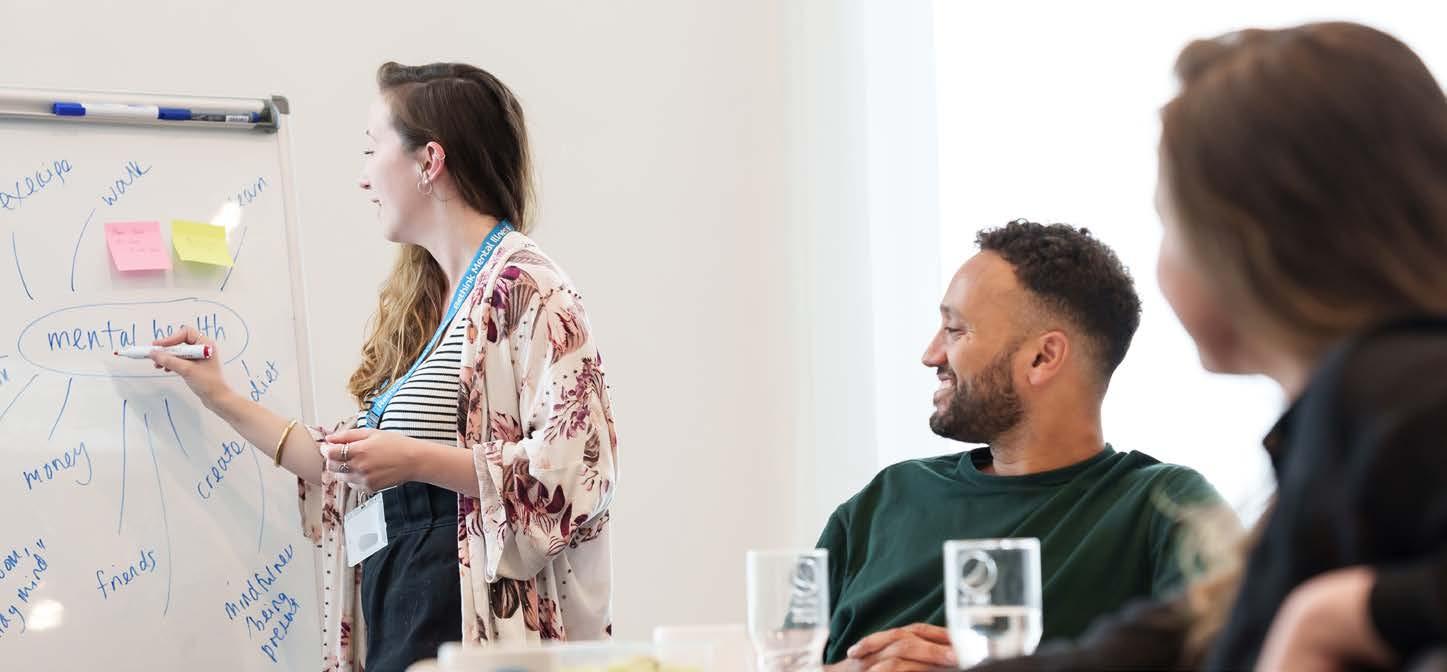
forms of treatment. A study by MQ Research compared the average research spend per person affected by various conditions between 2014-2017 and found while £228 was spent per person on cancer research, only £9 was spent per person affected by mental illness.4
Studies have also found a lack of collaboration across the research community. Approaches to research funding are often inflexible and do not support long-term joint working across different research disciplines. This means that research can often happen in silos rather than as part of a coordinated and focused research.5
The challenges outlined above can mean that mental health research studies do not always result in
compelling evidence around particular treatments, preventing them from becoming available to people who need them.
These are some of the barriers that we have identified through desk research, but we know they are by no means exhaustive and do not capture the full experiences of people severely affected by mental illness. We will be running further research and involvement opportunities in due course to gain a better understanding of these barriers and what role we can play in bringing about change.
If you are interested in getting involved in research opportunities in the future, please contact: membership@rethink.org.
4 MQ Mental health research (2017) UK Mental Health Research Funding
5 Journey of Mental Health (2021) Shared goals for mental health research: what, why and when for the 2020s
13 Research
A look at what our Suicide Bereavement Services do and how they support people
Our Suicide Bereavement Services aim to reach people within a few days of bereavement, ensuring they know they’re not alone and to help them with the practical and emotional aspects of suicide bereavement.
All services offer 1-1 support with a bereavement worker. Some services can work with anyone impactedfriends, colleagues, first responders, and witnesses. Other services primarily focus on next of kin and close family.
We also check in with people on the first anniversary of their bereavement.
Counselling:
In Gloucestershire and Surrey we have teams of volunteer counsellors who offer six weekly sessions (or longer if necessary) to those bereaved by suicide. In the Black Country we are able to have a full-time paid counsellor as part of the team. We also have a National Suicide Advisory Board where people with lived experience can contribute to the shaping of our services.
1-1 support:
Our bereavement workers help clients with the processes of an inquest, liaising with financial services and managing death notifications as well as potential media attention. We signpost to additional agencies who could support, especially with legal and financial matters.
We aim to support and protect the mental health of the client and to help overcome the potential stigma and shame associated with suicide.
Black Country Support After Suicide Service
“My support worker has been invaluable for me as I try to come to terms with this unimaginable loss. I'm forever grateful.”
Group support:
In Surrey, the Black Country and Gloucestershire we are able to offer group support. People can come together in a safe space to talk about their experiences of suicide bereavement and share support tools and strategies that have worked for them.
“It was comforting to see others were facing the same as me and we could all give each other strength and hope.”
14 Services
In December the Black Country Support After Suicide Service hosted a Reflection Service for families bereaved by suicide.
The service focused on grief, memories and hope. The families participated by sharing memories, poems they had written, and through music.
Gloucestershire and Surrey Support After Suicide Services linked up with Bags for Strife (BAGS).
Bags For Strife is a charity set up for people bereaved by suicide. BAGS stands for Blame, Anger, Guilt and Sadness. They distribute Bags For Strife to the Families of the bereaved, full of things of comfort and support.
In the summer of 2023, the Baton of Hope embarked on the biggest suicide prevention and awareness initiative the UK has ever seen, spanning 12 cities in 12 days. The baton was carried by the suicide bereaved from city to city.
Brighton and Hove took part in this amazing initiative.

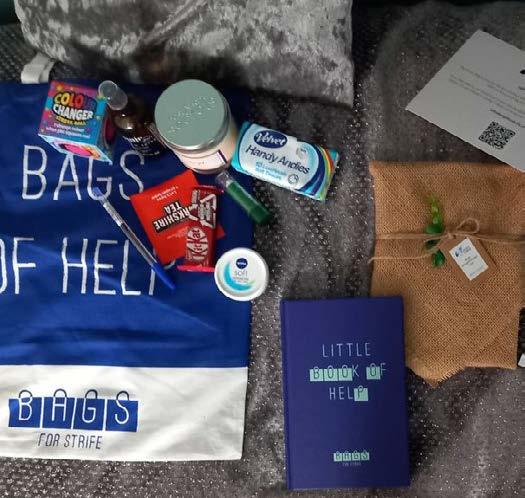
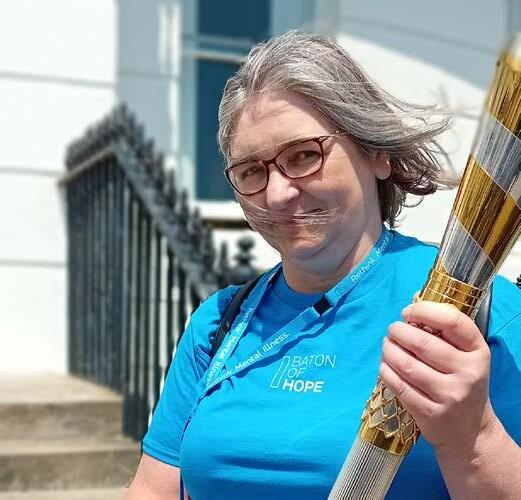
15 Services
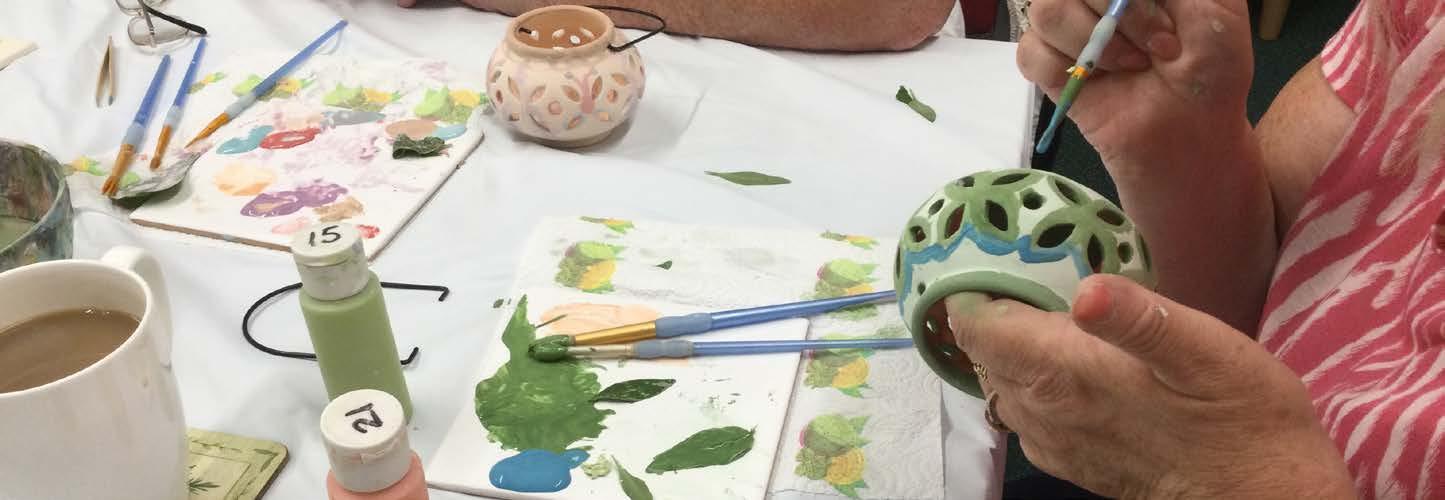
Brimington Craft Group
Led by the coordinator Beverley (known by everyone as Bev) the Brimington Craft Group in Derbyshire has recently become a registered group and is the sister group of the Eckington Craft Group. Both groups run weekly and offer mature people living with mental illness, alongside carers and family members, the chance to come together in a supportive space to socialise, share experiences, and offer encouragement to one another - at the same time as the chance to participate in a range of crafts. These include working with textiles, sewing, needlework, pottery, or card making. By taking part, members learn new skills and can also develop their confidence.
Bev says the group, that has a waiting list, is a lifeline to some members, being the only social activity of the week. When people join, they keep to themselves, are very quiet and keep their heads down but after a few weeks, those heads
bob up, members make connections and the isolation they once felt, drops away. The need for the two groups five miles apart highlights the transport challenges generated by a drastically reduced bus service in the area. Having another group in Brimington keeps it accessible and inclusive.
The group also have occasional outings, such as going out for a meal together. This group provides the chance to mix with a range of people with similar experiences and to be there for each other, providing friendship.

16 Groups
Mind Body Medicine Yoga Group
A group that helps with managing trauma through yoga.
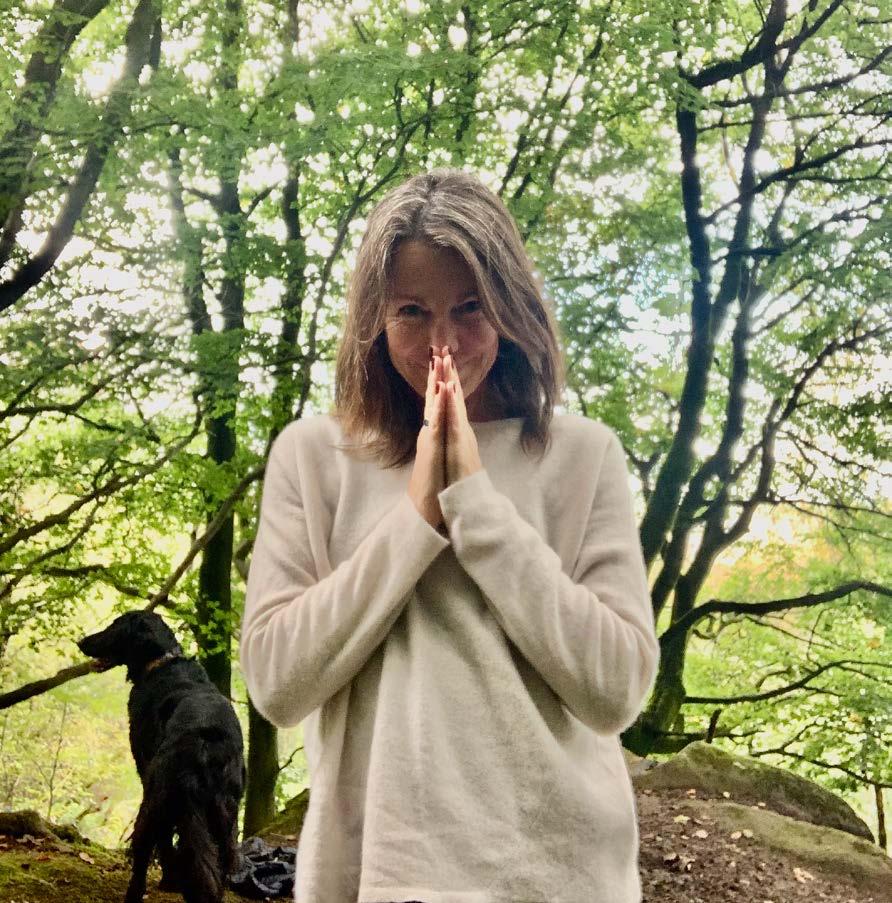
Mind Body Medicine Yoga is a group held weekly in Highgate in London for those impacted by suicide loss. Fiona, the yoga teacher, has lived experience of suicide loss herself and she designs yoga sequences to help the body support the mind as clients learn to navigate their experiences of trauma.
The group is open to anyone who has had this experience, regardless of the relationship to the lost loved one or, of the amount of time since that happened.
Fiona recalls, “I realised I could only be in my own mind for so long, but I could use my body, through movement, to inform my mind and give me spells of peace. The yoga
mat becomes very special to you and is a place of calm where you can step off the treadmill of grief.”
The yoga sessions are Hatha based in their style and offer the focus and right use of energy, bringing freshness and relief to the body and the mind. There is a teaching point each week at the start; something gentle and supportive, designed to ease clients back to themselves and to know that they are good enough.
The group was newly established in September 2023 and is still welcoming new members. Please contact Fiona at mindbodymedicine@rethink.org or 07805760672 to find out more.
17 Groups
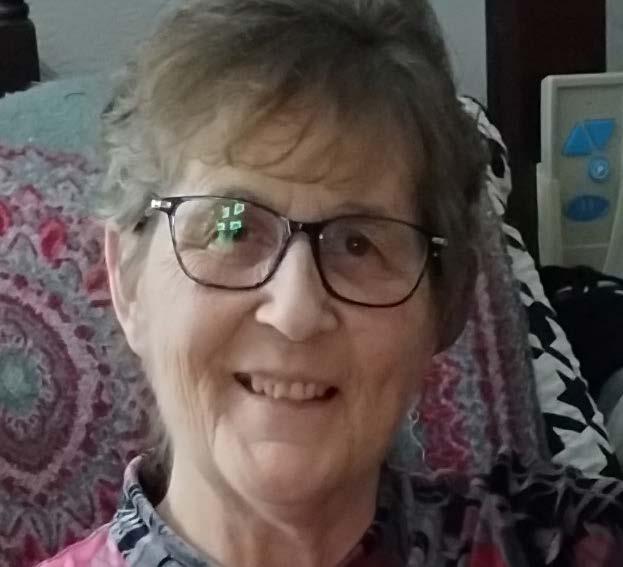
Teresa's legacy
"
It's my way of paying it forward.
"
In an article in our summer issue we introduced you to Teresa, a dedicated supporter, who set up a tribute fund in memory of her son Jerome. Teresa now shares more about her reasons for deciding to leave a gift to us in her Will.
18
"After Jerome died I set up a tribute fund in his name and have raised nearly £10,000 for our local peersupport group. I have also taken the decision to leave a percentage of my estate to Rethink Mental Illness in my Will.
The support Jerome received from the charity was life-changing. For the first time he was seen as someone who was valued, and treated like any other human being - not a diagnosis or a patient. Through the support and advocacy of Rethink Mental Illness, he had the potential to live a bigger, better life.
A gift in my Will is my way of paying that forward. I want other people to be treated the same way. And it’s not just at a local or individual level that I want Rethink Mental Illness to be able to change lives. The organisation is all about positive change and making things better for people affected by mental illness.
Politicians seem to be so inconsistent - mental illness goes up and down the agenda. We experienced that with Jerome, who was in supported living, and then moved out ‘into the community’ with next to no support. I know Rethink Mental Illness are the opposite of that - they are there consistently, always speaking up for people affected by mental illness, and always will be. My gift is my way of making sure it continues.
Why am I telling you all this? Well, I often noticed that having a child with mental illness was seen by some as something to be ashamed of or guilty about, and kept hidden. I’ve never felt that way, so I’ve always tried to speak openly about Jerome and his life, and our experiences. I feel much the same about what happens after we’re gone - we should be able to talk about our intentions more openly, including with our families. My husband and sons all know about and completely support my decision to leave some of my estate to the charity.
I’ve been open with the legacy team at Rethink too. I really value my relationship with the people I’ve met there. I know who I’m dealing with and that makes such a big difference. They keep me informed and I know I can always pick up the phone to them."
Make a difference
Our team is always on hand to help you understand how you can make a difference through your Will, with no obligation or pressure. To find out more call Nicole, our Legacy and In Memory Manager, on 020 7840 3109 or email
legacyinfo@rethink.org
19 Legacy
Awards
Meet our 2023 Pringle Award winners
Our annual Pringle Awards recognise people and groups who have made a real difference to people severely affected by mental illness during the previous year.
You can read more about each of our winners at: rethink.org/2023pringleawards
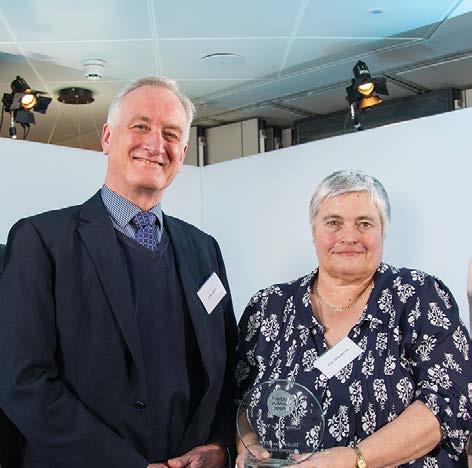
Group of the Year: Derbyshire Borderline Personality Disorder Group
"We’re so lucky to have it really. There must be thousands of people struggling with BPD alone with nobody to turn to, but we have each other” Group member
Nominations for our 2024 awards will open in the summer issue of Your Voice.
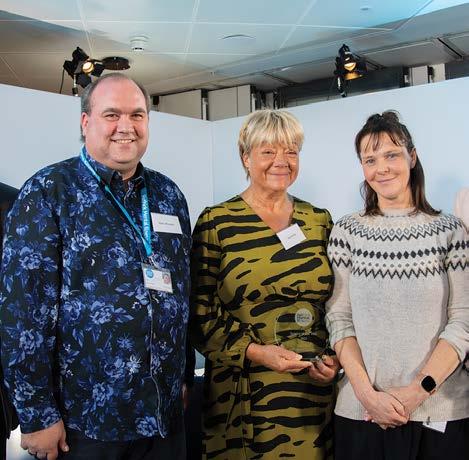
Service of the Year: John Hall Wellness Garden
"We have no end of people coming in saying how wonderful and peaceful the garden is. It’s a special place they can come to and enjoy and have the foundation of their wellbeing improved and that’s what we’ll keep striving to do”
Marc Woodley, contract manager
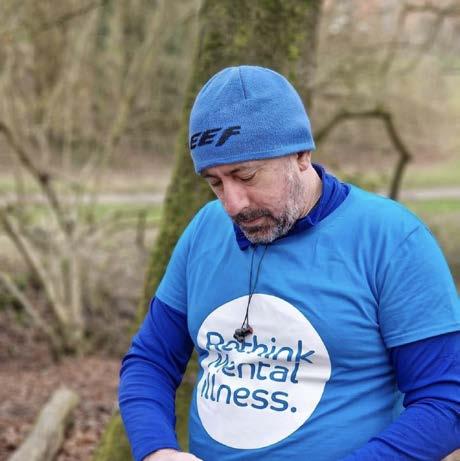
Supporter of the Year: Bryan Smith
"Bryan, fondly known as 'The Walking Man from Bristol', has dedicated his life to making a profound impact on mental health awareness and support. His journey has been nothing short of inspiring, and his unwavering commitment to the cause deserves recognition and applause.”
Bhavika Jadav, group coordinator at Bristol Rethink Mental Illness services
20
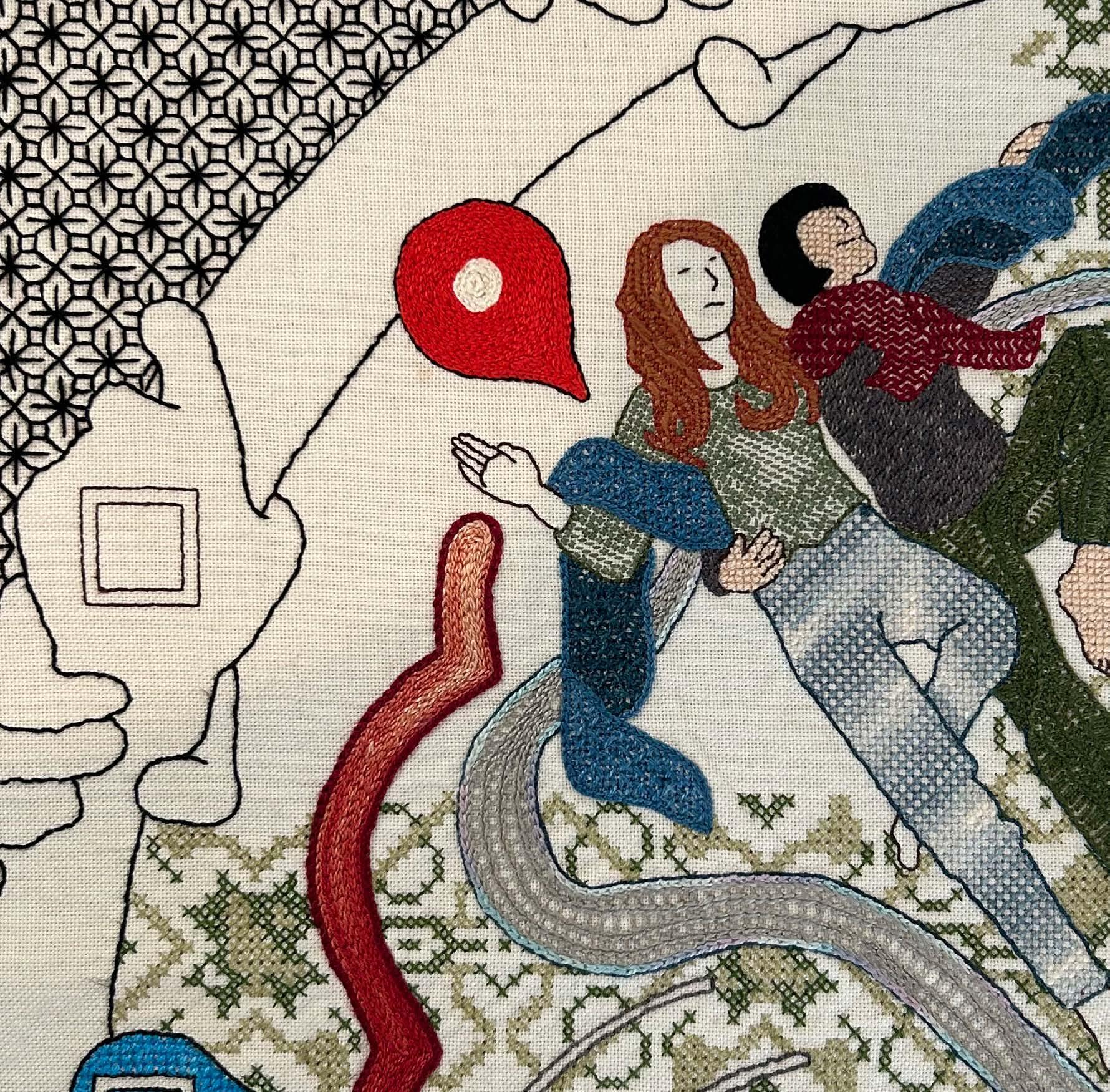
Steph’s always been a passionate artist. She fell ill at 16 and has since been diagnosed with schizoaffective disorder. She’s about to start a Masters degree in illustration at Falmouth and hopes there will be opportunities to expand on her embroidery interest there.
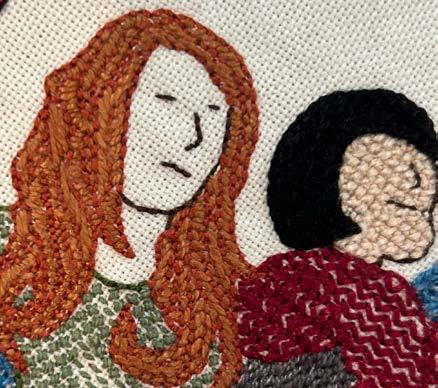
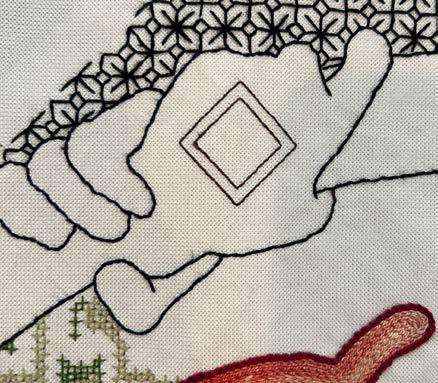
"
I can’t imagine not sewing; embroidery is very therapeutic.
21 Creative Voice
"
Bill Pringle Award for Art: Steph Collins
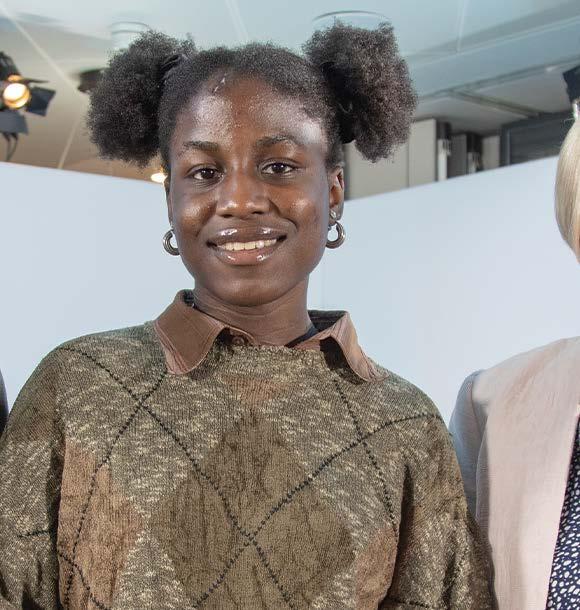
Insomniac.
Waking up already tired from my debilitating anxiety.
Melatonin after melatonin and still no satiety.
My thoughts keep me up, up they keep me.
Over thinking every little action I made and how that was perceived.
Jumping to conclusions or overgeneralising or my binary perspective- it kills me. And in the end, it’s the worst I believe.
Indecisive.
In her poem, Anjola expresses the sense of exclusion she battled with every day at school. She felt there was a lack of awareness of how to navigate neurodivergence, making it especially hard for children with autism and ADHD to feel included in the school environment and with schoolwork.
Here are some verses of her winning poem and you can read the full version online at rethink.org/2023pringleawards.
Debating whether or not to go to school, a daily occurrence. For starters, the people are a clear deterrence.
How will I function, when i’m already drained?
And the sounds of people talking will definitely be a pain.
I think of art and how I will miss it if i stay, And that fuels me, giving me strength for the day.
22 Creative Voice
Bill Pringle Award for Art: Anjola Akerele
22
Meet our 2023 Janey Antoniou Award winners
Our Janey Antoniou Award celebrates campaigners with lived experience of mental illness who go the extra mile to challenge stigma and discrimination.
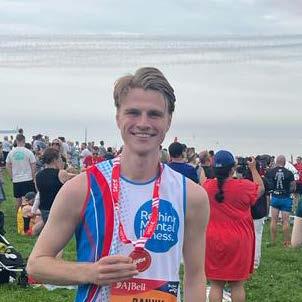

Sophia is passionate about making sure young people receive the support they need for their mental health as early as possible. This led Sophia to design and deliver workshops for pupils in her school to promote positive mental health.
Danny’s campaigning started in 2013 months after his recovery from body dysmorphic disorder. He recognised the need to speak out about the disorder and the unique experiences of men with body image issues. His campaign went viral in 2014, reaching international audiences. Since then, he’s continued his campaigning through producing research for think-tanks, working with MPs to improve policy, speaking at conferences, regularly appearing in the media and even starting a PhD on the topic.

Tanya founded a local youth mental health charity which offers resources for schools, parents and young people struggling with their mental health. Since then, the charity has grown to support hundreds of people not just in the UK, but internationally.
23 Awards
Sophia Badhan, Award finalist
Danny Bowman, Award winner
Tanya Marwaha, Award finalist
Make sure your voice is heard at this election
Register to vote at: www.gov.uk/register-to-vote
We are in an election year, and we will do everything we can to get all political parties to commit to improving mental health provision.
You can choose to vote in person, by post or by proxy, which is when you apply for someone else to vote for you.
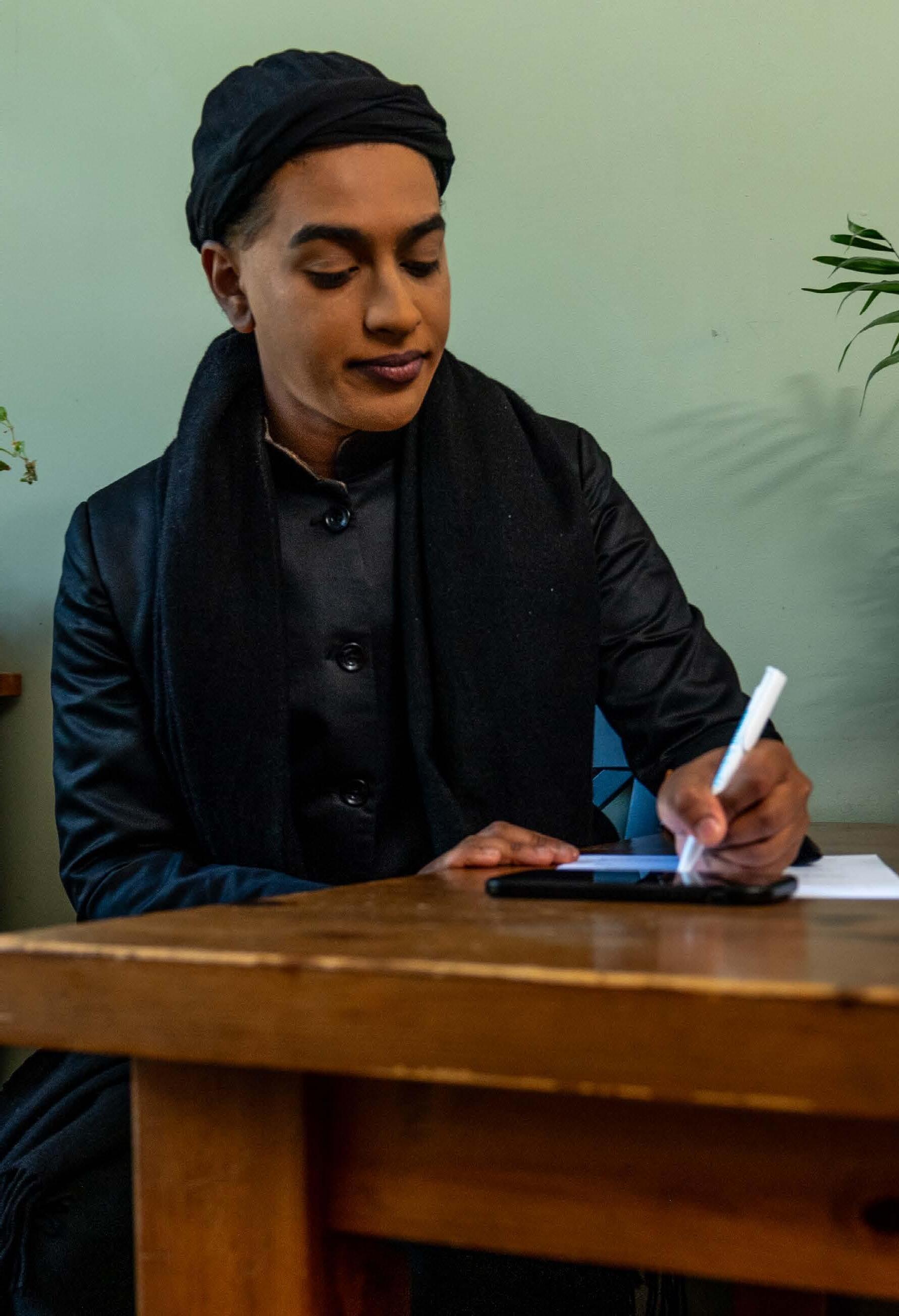
Scan me



























